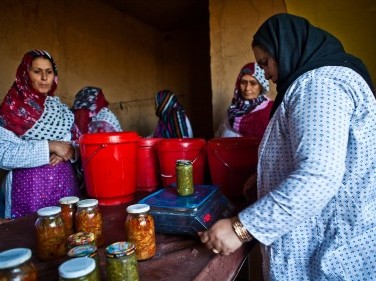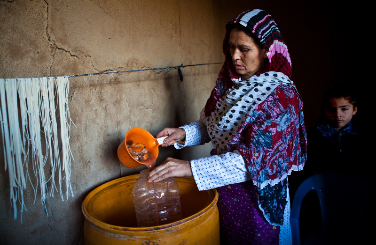
Meet Najia, Nahri Shahi district’s most canny businesswoman
Najia is a canny entrepreneur in more ways than one. Armed with nothing but her wits and the skills she learned at a Hand in Hand Afghanistan Self-Help Group, the mother of four increased her income from zero to 40,000AFN (US $720) a month – all by selling canned goods.
Financial success has of course been rewarding, says Najia, who like most Afghans has no surname. But a newfound sense of empowerment makes the long, often gruelling hours especially worthwhile. “My life has totally changed,” she says. “I’m no longer dependent on anyone else’s income and I can easily purchase clothes and school materials and take my children to the doctor. I’m even saving for emergencies – and to expand my enterprise.”
Loans, not grants
Like any budding entrepreneur, Najia needed credit. There was just one problem: she didn’t qualify, not even for a microloan. Self-Help Groups offer members the opportunity to learn, to develop opportunities, even simply to socialise outside the home. They also offer access to group savings funds, available to members who’ve paid in and undergone training. As soon as she was ready, Najia applied for a loan using a strategy every bit as simple as it was effective: serving her food to group members and letting it do the talking. The group was convinced; Najia got her loan.
“I had the talent,” she says, “but I didn’t know the basics of enterprise. Hand in Hand Afghanistan mentors helped me establish myself, both in terms of training and funding.”
“My life has totally changed. I’m no longer dependent on anyone else’s income and I can easily purchase clothes and school materials and take my children to the doctor”

Najia secured two loans – 21,000AFN (US $378) from her group then 10,000AFN (US $180) from Hand in Hand, both now paid off. The first went to setting up her operation, the second to diversifying her product range.
“We prepare cans of pre-cooked meals with ingredients including okra, eggplant, peas, noodles and meat. I also make ketchup and jam,” she explains. “My meals are good quality and I supply them to the market quickly.”
Super markets
Starting out, Najia sold her food in neighbouring villages. Drawing on the lessons she’d learned about market linkages, she soon moved into Mazar-i Sharif. Then came her biggest success yet: a deal supplying food to the Ariana Supermarket.
Today, Najia has 18 part-time staff. She hopes to hire them full-time soon. “We plan to establish a small food product manufacturing plant with modern labelling machines to compete with imported cans,” she says.
Building confidence
 Impressive as it is, Najia’s success is not unique. According to a recent independent review commissioned by the Swedish International Development Cooperation Agency (Sida), Afghans are reaping the benefits of Hand in Hand’s programmes, citing the value of training and savings, as well as a newfound freedom of movement. Others meanwhile credited interaction among group members with instilling a new sense of self-confidence. Not surprisingly, Najia was among them.
Impressive as it is, Najia’s success is not unique. According to a recent independent review commissioned by the Swedish International Development Cooperation Agency (Sida), Afghans are reaping the benefits of Hand in Hand’s programmes, citing the value of training and savings, as well as a newfound freedom of movement. Others meanwhile credited interaction among group members with instilling a new sense of self-confidence. Not surprisingly, Najia was among them.
“I feel happy I decided to start my own business,” she says. “And confident to expand it.”
Najia’s results
![]()
Increased monthly income from 0 to 40,000 AFN (US $720)
![]()
Expanded business to other districts and local supermarkets
![]()
Employed 19 part-time staff
Next case study: Meet Gloria, the former refugee growing crops – and profits
